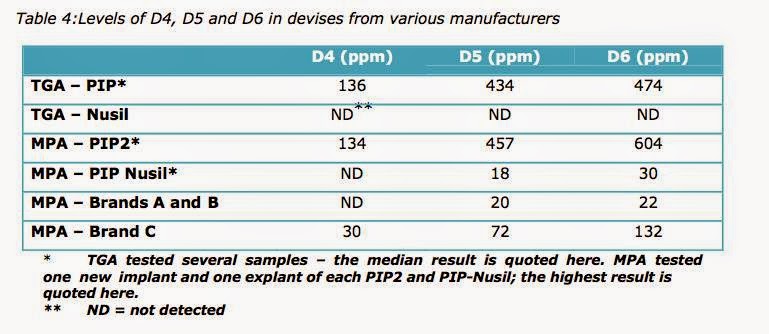PIP ACTION CAMPAIGN takes part in the public consultation on D4 and D5 in shampoo!
REACH Restriction on the use of TOXIC Endocrine Disrupting Chemicals (EDCs) … but only in Rinse-off Personal Care Products!
5 January 2015 – PIP ACTION CAMPAIGN submitted evidence to the ECHA public consultation calling on REACH to Restrict TOXIC D4 and D5 in the environment, Personal Care Products, Cosmetics and Medical Devices! The full document is available to read & review on the link provided below.
D4 is a known Endocrine Disrupting Chemical.
The concerns over EDCs exposures in the European Union are increasing:
Women with PIP implants have been informed they are not toxic,
but is this true?
Women exposed to toxic and EDC exposures in PIP implants are reporting a shocking array of symptoms associated with D4 and D5.
Take a Look at PIP ACTION CAMPAIGN`s Health Survey
And
Read and review PIP ACTION’s submission to the Public Consultation here
It took a 3 month battle for the Daily Star to get hold of the 51page report this was May 2012, Pip were actually banned March 2010..
Pip Implants are filled with Industrial silicone , in fact 68 were found in pip implants and are so hazardous that strict rules govern how they can be used.
In fact 1 chemistry professor said ; “There may be a tenth of a millionth of a gram but that doesn’t mean that it’s not of concern. “Some components can be very toxic in small amounts. I wouldn’t necessarily want to have those in my body, regardless of size.” Another said: “There are a lot of nasty things in there.”But yet Scenihr, MHRA and Department of Health say There not toxic and we have nothing to worry about.Which goes against what our
"Ethic professionals" say .“The combination of higher concentrations of D4 and the changes in the silicone which happen when the implant is within the body, finally explain the issues that surgeons and patients have been seeing and experiencing around the country. We urge the Government, who we know have collected in vivo specimens, to perform similar analyses - as a matter of urgency.”"The problem is that some of these chemicals... are not inert & may be potentially toxic" #PIP D4 TOXIC http://bit.ly/1bXDQGE
Mmmmmmmmmmmmmmm
Mmmmmmmmmmm ONCE AGAIN !!!!!!!!!!
Recent results from a 2 year repeated vapour inhalation exposure study to rats of decamethylcyclopentasiloxane (D5) indicate effects (uterine endometrial tumors) in female animals. These effects, which have been shown to be rat-specific, occur at highest exposure dose (160 ppm) only, a level that greatly exceeds typical workplace or consumer exposures. Industrial, Read more
PIP TGA (sterile implants) D5 434ppm (middle figure - not lowest OR highest
PIP MDA (explanted) D5 457 ppm (middle figure - not lowest OR highest)
D4 CAS 556-67-2 octamethylcyclotetrasiloxane is a known, category 1,
Endocrine Disruptor Chemical (EDC)
There is NO mention of Endocrine disruptor chemicals (EDCs) in SCENIHR final opinion ...They have totally dismissed the fact that these chemicals are toxic and are KNOWN EDC`s... Mhra have even deemed it safe for women to breastfeed , they have only done 1 test on a sample of milk that`s not SCIENCE that`s DISPICABLE ..Read more on this here
Other chemicals found in pip implants are Toluene * Acetone Xylene Cyclohexane Ethylbenzene *D6 * Chloroform * Dichloromethane * Ethanol * Ethyl Acetate * Silopren * Baysiline * Platinum * Caesium* Methanol * Isopropanol * 1-Butanol * Butyl * Benzophenone * di-2-ethylexyl phtalate
We note in toxicological tests finally published in 30 July 2012 by MHRA, dichloromethane a substance banned for public use 6/12/2011 and chemicals such as toluene, caesium and heptane, all highly TOXIC none of which have ever been tested or approved for human use.
The PIP Implant scandal is a serious international health fraud.
It’s a shocking account of corruption, greed, injury and exploitation. The health of over half a million women and their children internationally has been compromised sometimes permanently and occasionally fatally through exposure to toxic chemicals in breast implants.Learn more here
Heneghan said: What they ended up doing was using an industrial-grade silicone, which – if you look at the trial – they can’t actually tell what the content are. I suspect they did that because it was cheaper."What would the impact be?Why is that dangerous to people’s health? Heneghan said: " When you implant something inside the body it’s very important that it’s inert. It doesn’t do anything; it doesn’t cause any toxic reaction. Sometimes these implants can actually burst and leak into a human body. And the problem is that some these chemicals that are different, this industrial-grade, are not inert and may be potentially toxic and there are some concerns that may even be cancerous." Read more:
Concerns raised over use of chemicals in medical devices
Published: 17.10.2007
Phthalates are chemicals used to soften plastics in products as varied as clothes, PVC materials and food packaging. They are believed to be harmful to human health, causing damage to the reproductive system and increasing the risk of allergies, asthma and cancer.Their use in medical devices is a particular cause for concern, because high risk groups, such as newborn babies, can be highly exposed during medical treatment.The report, published on 15 October, takes into account new scientific data and concludes that despite a lack of clinical evidence for harmful effects on humans, the high exposure of patients to phthalates during medical treatment is a cause for concern. Read more;

